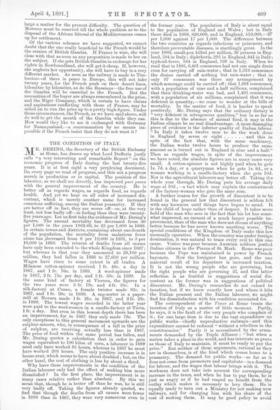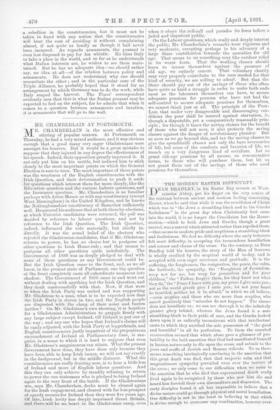THE CONDITION OF ITALY.
it/FR. DERING, the Secretary of the British Embassy at Rome, has drawn up what Lord Dufferin justly calls "a very interesting and remarkable Report" on the economic progress of Italy during the last twenty-five years. It is at first sight a very perplexing document. On every page we read of progress, and this not a progress merely in production or in capital. The position of the labourer, as we shall see directly, has improved pan i pasata with the general improvement of the country. He is better off as regards wages, as regards food, as regards health. And yet we hear on all sides of increased dis- content, which is 'merely another name for increased conscious suffering, among the Italian peasantry. If they are better off in fact, they are worse off—or, at the very least, not less badly off—in feeling than they were twenty- five years ago. Let us first take the evidence of Mr. Dering's figures. The annual mortality has decreased from 30 per 1,000 in the years 1862-66, to 25 per 1,000 in 1889. In certain towns and districts, containing about one-fourth of the population, the mortality from malarious fever alone has ,decreased from 6 per 10,000 in 1881, to 3 per 10,000 in 1888. The returns of deaths from all causes have only been extended to the whole Kingdom since 1887; but whereas in that year they amounted to 28,100 per million, they had fallen in 1888 to 27,600 per million. Wages have risen to some extent in all trades. A Milanese cotton-spinner received 1 fr. 40c. a day in 1867, and 1 fr. 94c. in 1889. A wool-spinner made in 1867, 2 fr. 75c. per day, and 5 fr. 50c. in 1889. In the same kind of factory at Vicenza, the figures for the two years were 3 fr. 19c. and 4 fr. $5c. In a, silk-factory at Cuneo, a female twister made 92c. in 1867, and 1 fr. 30c. in 1889. A rag-sorter in a paper- mill at Novara made 1 fr. 21c. in 1867, and 2 fr. 28e. in 1889.. The lowest wages recorded in the latter year were paid to the workwomen in a candle-factory at Turin, 1 fr. a day. But even in this lowest depth there has been improvement, mprovement, for in 1867 they only made 78c. The only exceptions to this general movement upwards are the sulphur-miners, who, in consequence of a fall in the price of sulphur, are receiving actually less than in 1867. The price of food within the same period has fallen, and Mr. Dering quotes a calculation that in order to gain wages equivalent to 100 kilos. of corn, a labourer in 1889 need only have worked 95 hours, whereas in 1867 he must have worked 203 hours. The only positive increase is in house-rent, which seems to have about doubled ; but, on the other hand, the cost of clothing is less by about a third. Why have these improvements in the condition of the Italian labourer only had the effect of making him more dissatisfied ? In the first place, the improvement is in many cases relative rather than absolute. By this we mean that, though he is better off than he was, he is still very badly off. Taking the figures already quoted, we find that though the deaths from all causes were fewer in 1888 than in 1887, they were very numerous even in the former year. The population of Italy is about equal to the population of England and Wales ; but in Italy there died in 1888, 820,000, and in England, 510,000,-27 per 1,000 against 17 per 1,000. The difference between the two countries as regards infectious or poisonous, and therefore preventable diseases, is startlingly great. In the year 1888, small-pox killed per million, 36 persons in Eng- land, 594 in Italy ; diphtheria, 295 in England, 841 in Italy; typhoid-fever, 184 in England, 769 in Italy. When we read that in 1885,6,401 communes had not one single drain even for carrying off rain-water ; that in 1,313 communes the drains carried off nothing but rain-water ; that in only 97 communes was there any arrangement by which sewerage could be carried off ; that 1,881 communes, with a population of nine and a half millions, complained that their drinking-water was bad, and 1,495 communes, with a population of six millions, complained that it was deficient in quantity,—we cease to wonder at the bills of mortality. In the matter of food, it is harder to speak positively. Mr. Dering says that the ordinary dietary is "very deficient in nitrogenous qualities," but in so far as this is due to the absence of animal food, it may in the Italian climate be no real disadvantage. A more damaging piece of evidence is the inferior quality of Italian labour. "In Italy it takes twelve men to do the work done in England by seven or eight and this in spite of the fact that, with the same machinery, the Italian works twelve hours to produce the same amount as is turned out in England in nine and a half."
Then as regards wages, in spite of the improvement we have noted, the absolute figures are in many cases very small. A cotton-spinner is not highly paid when he gets is. 7d. a day, or a quarryman when be gets is. 8d., or a woman working in a candle-factory when she gets 10d.
Nor is the agricultural labourer any better off. Taking the whole year through, Mr. Dering puts his average daily wage at 10d ,—a fact which may explain the contentment of the factory-woman who gets the same sum. A further reason for the growth of discontent is to be found in the general law that discontent is seldom felt with any keenness until things have begun to mend. It is the child of hope rather than of despair. It takes more hold of the man who sees in the fact that his lot has some- what improved, an earnest of a much larger possible im- provement, than of the man who does not dream of anything better because he has never known anything worse: The special conditions of the Kingdom of Italy make this law unusually operative. When the country was under foreign domination, it was natural to trace every evil to this one cause. Venice was poor because Austrian soldiers jostled. Italian citizens in the Piazza of St. Mark. Rome was poor because the Pope was maintained in power by French bayonets. Now the foreigner has gone, and the one material result of his departure is increased taxation. It is not the wrong people who are governing, but the right people who are governing ill, and this latter reflection is as fruitful in suggestions of social dis- content as the former was in suggestions of political discontent. Mr. Dering's researches do not extend to taxation, but if we knew exactly how and where it hits the Italian peasant and the Italian labourer, we might. find his dissatisfaction with his condition accounted for.
The correspondent of the Times at Rome treats the taxation of Italy as a matter of little moment. Partly, he says, it is the fault of the very people who complain of it ; for one large item is due to the vast expenditure on public works—chiefly unproductive railways—and this expenditure cannot be reduced "without a rebellion in the constituencies." Partly it is necessitated by the arma- ments demanded by the Triple Alliance ; "but when a nation takes a place in the world, and has interests as grave as those of Italy to maintain, it must be ready to pay the price." But neither of these arguments, rational as they are in themselves, is of the kind which comes home to a peasantry. The demand for public works—so far as it does not come from promoters and capitalists—is a demand for labour, and the wages that labour brings with it. The workman does not take into account the corresponding increase in the taxes, and when he has to pay them, he is just as angry as if he had reaped no benefit from the outlay which makes it necessary to levy them. He is equally rpii,dy to turn out a Ministry for not making new railways, and for charging him with his share of the cost of making them. It may be good policy to avoid a rebellion in the constituencies, but it must not be taken in hand with any notion that the constituencies will bear the cost of avoiding it without complaining almost, if not quite as loudly as though it had never been incurred. As regards armaments, the peasant is even less disposed. to pay for his whistle. He likes Italy to take a place in the world, and so far as he understands what Italian interests are, he wishes to see them main- tained. But he has no adequate idea—we should rather say, no idea at all—of the relation between policy and armaments. He does not understand why one should necessitate the other ; and in the particular case of the Triple Alliance, he probably hoped that it stood for an arrangement by which Germany was to do the work, while Italy reaped the harvest. The Times' correspondent evidently sees that this is what the Italian peasant may be expected to feel on the subject, for he admits that when it comes to a question between armaments and taxation, it is armaments that will go to the wall.







































 Previous page
Previous page